unit1 2单元语法小专题
初一英语一二单元知识点总结
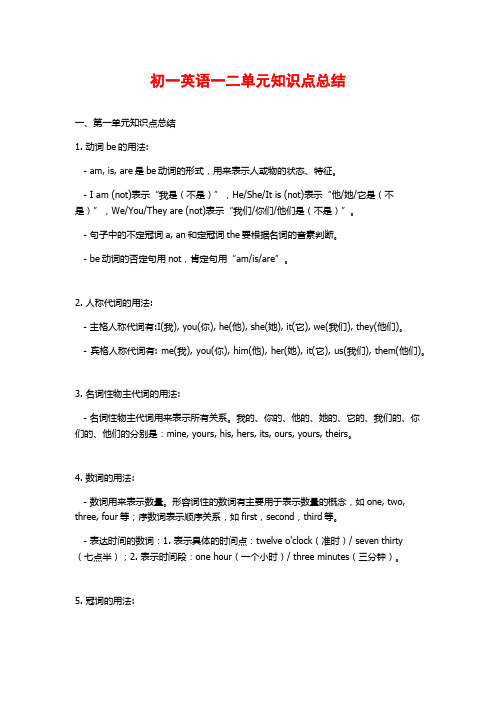
初一英语一二单元知识点总结一、第一单元知识点总结1. 动词be的用法:- am, is, are是be动词的形式,用来表示人或物的状态、特征。
- I am (not)表示“我是(不是)”,He/She/It is (not)表示“他/她/它是(不是)”,We/You/They are (not)表示“我们/你们/他们是(不是)”。
- 句子中的不定冠词a, an和定冠词the要根据名词的音素判断。
- be动词的否定句用not,肯定句用“am/is/are”。
2. 人称代词的用法:- 主格人称代词有:I(我), you(你), he(他), she(她), it(它), we(我们), they(他们)。
- 宾格人称代词有: me(我), you(你), him(他), her(她), it(它), us(我们), them(他们)。
3. 名词性物主代词的用法:- 名词性物主代词用来表示所有关系。
我的、你的、他的、她的、它的、我们的、你们的、他们的分别是:mine, yours, his, hers, its, ours, yours, theirs。
4. 数词的用法:- 数词用来表示数量。
形容词性的数词有主要用于表示数量的概念,如one, two, three, four等;序数词表示顺序关系,如first,second,third等。
- 表达时间的数词:1. 表示具体的时间点:twelve o'clock(准时)/ seven thirty(七点半);2. 表示时间段:one hour(一个小时)/ three minutes(三分钟)。
5. 冠词的用法:- 不定冠词a/an的用法:a用于以辅音音似开头的单词前,an用于以元音音似开头的单词前。
- 定冠词the的用法:指特指的人或物。
二、第二单元知识点总结1. 人称代词的宾格形式:- 单数形式:me(我)、you(你/你们)、him(他)、her(她)、it(它);- 复数形式:us(我们)、you(你们)、them(他们)。
人教版九年级英语 Unit 1、Unit 2 重要语法知识点总结
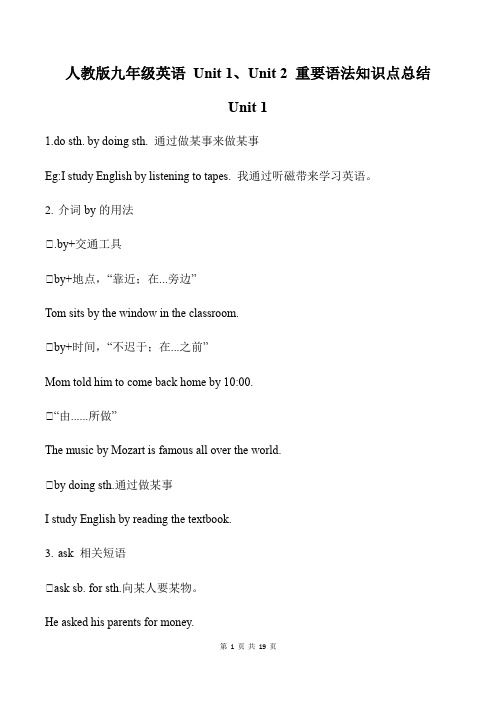
人教版九年级英语Unit 1、Unit 2 重要语法知识点总结Unit 11.do sth. by doing sth. 通过做某事来做某事Eg:I study English by listening to tapes. 我通过听磁带来学习英语。
2.介词by的用法①.by+交通工具①by+地点,“靠近;在...旁边”Tom sits by the window in the classroom.①by+时间,“不迟于;在...之前”Mom told him to come back home by 10:00.①“由......所做”The music by Mozart is famous all over the world.①by doing sth.通过做某事I study English by reading the textbook.3.ask 相关短语①ask sb. for sth.向某人要某物。
He asked his parents for money.①ask sb. about sth.向某人询问某事Can I ask about the result of the match?我可以问一下比赛的结果吗?①ask sb.(not) to do sth.要求某人(不)做某事(被动语态)--be asked (not) to do sth.被要求(不)做某事My mother asked me not to play in the street.4.have conversations with friends in English和朋友用英语交谈5.speaking skills 口语技能spoken English 英语口语6.read aloud 朗读 a little nervous 有点儿紧张7.It’s +adj.+(for sb.)+to do sth.做某事对某人来说是怎么样的。
Unit1-2 基础提高与扩展——语法
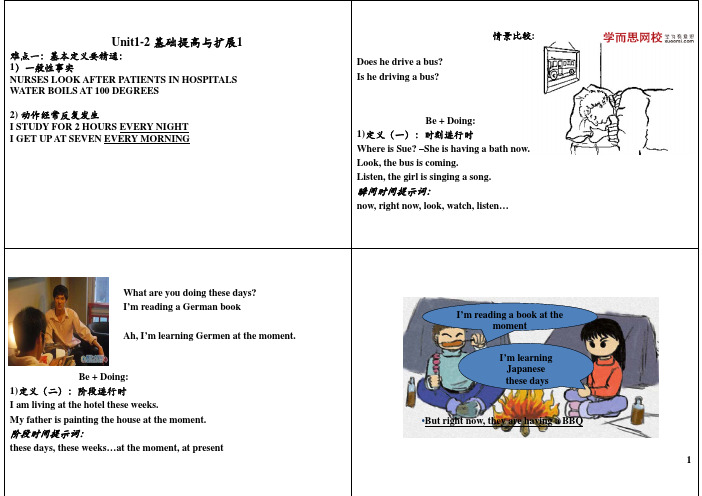
If Jane back tomorrow evening, I don’t know if I her. A. comes; will visit B. comes; visit C. will come; visit D. will come; will visit ---What will Bill do if he ____in the test? ---He will try y again. g A. fail B. fails C. will fail D. is failing --- Don Don’t t forget to ask him to write to me. me --- I won’t. As soon as he _______, I’ll ask him to write to you. A will come A. B. B came C. C comes D. D is coming Don’t leave until he ______ back. A h A. have come B B. comes C will C. ill come D cam D. When I _____her in the hall, she was playing the piano. A See A. B saw B. C will see C. D am seeing D.
瞬间时间提示词:
now, right now, look, watch, listen…
What are you doing these days? I’m reading a German book Ah, I’m learning Germen at the moment.
I’m reading a book at the moment I’m I m learning Japanese these days y
新目标七年级英语下1-2单元知识语法总结 +练习
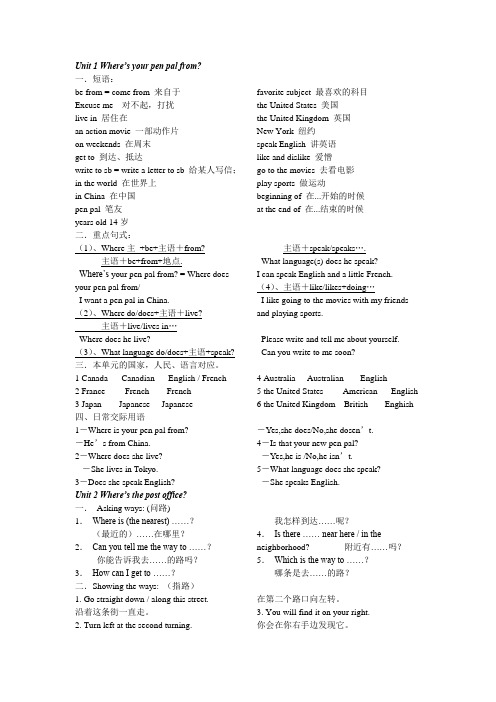
Unit 1 Where’s your pen pal from?一.短语:be from = come from 来自于Excuse me 对不起,打扰live in 居住在an action movie 一部动作片on weekends 在周末get to 到达、抵达write to sb = write a letter to sb 给某人写信;in the world 在世界上in China 在中国pen pal 笔友years old 14岁favorite subject 最喜欢的科目the United States 美国the United Kingdom 英国New York 纽约speak English 讲英语like and dislike 爱憎go to the movies 去看电影play sports 做运动beginning of 在...开始的时候at the end of 在...结束的时候二.重点句式:(1)、Where主+be+主语+from?主语+be+from+地点.Where’s your pen pal from? = Where does your pen pal from/I want a pen pal in China.(2)、Where do/does+主语+live?主语+live/lives in…Where does he live?(3)、What language do/does+主语+speak?主语+speak/speaks….What language(s) does he speak?I can speak English and a little French. (4)、主语+like/likes+doing…I like going to the movies with my friends and playing sports.Please write and tell me about yourself. Can you write to me soon?三.本单元的国家,人民、语言对应。
七年级(下)Units 1-2语法天地

七年级(下)Units1-2语法天地一般现在时的自述同学们好!我叫一般现在时,在时态家族中,我是老大哥。
在英语中,我的应用最广泛,是你们学习英语语法的重点。
一、如果同学们想要找我,请到下面三个地方去找:1)经常性、习惯性的动作或存在的状态。
eg:I go to school on foot. 我步行去上学。
He is very busy now. 他现在非常忙。
2)表示主语的特征、性格、能力、爱好等。
eg:He can swim. 他会游泳。
I like watching TV. 我喜欢看电视。
3)表示客观真理。
eg:There are seven days in a week. 一周有七天。
The moon moves round the earth. 月亮绕着地球转。
二、我的结构按正常语序,也就是“主语+谓语+其它”,有时为了起强调作用,我常常把时间状语提到前面。
我的句式变化可分为两种情况:1)表示动作,一般人称作主语的,变否定句时须在动词前面加助动词don’t;变一般疑问句时须在句首加助动词do。
eg:They have lunch at 12:00.→They don’t have lunch at 12:00.Do they have lunch at 12:00?2)第三人称单数作主语的,变否定句时须在动词前面加助动词doesn’t,动词恢复原形;变一般疑问句时须在句首加助动词does,动词恢复原形。
eg:Jenny speaks English very well.→Jenny doesn’t speak English very well.Does Jenny speak English very well?3)含有be动词的要在be上做变化。
eg:Danny is a good student.→Danny isn’t a good student.Is Danny a good student?三、我的时间状语多为often,usually,always,sometimes等频率副词,on Saturdays,in the morning(afternoon evening),every day等。
必修1Unit1、2语法和词汇练习
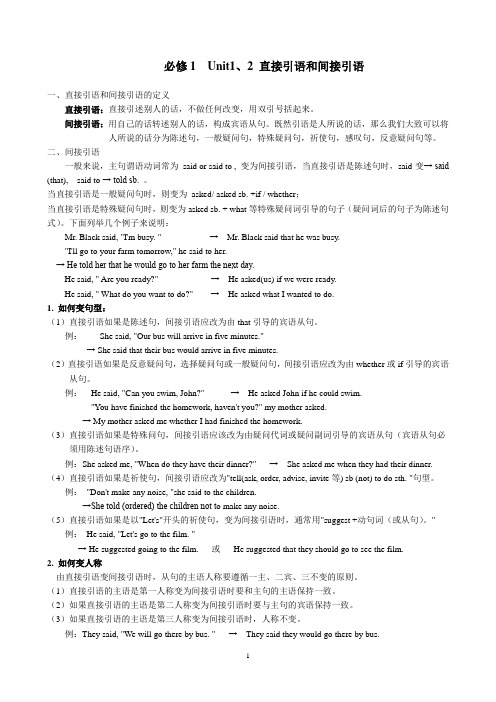
必修1 Unit1、2 直接引语和间接引语一、直接引语和间接引语的定义直接引语:直接引述别人的话,不做任何改变,用双引号括起来。
间接引语:用自己的话转述别人的话,构成宾语从句。
既然引语是人所说的话,那么我们大致可以将人所说的话分为陈述句,一般疑问句,特殊疑问句,祈使句,感叹句,反意疑问句等。
二、间接引语一般来说,主句谓语动词常为said or said to , 变为间接引语,当直接引语是陈述句时,said-变→ said (that), said to → told sb. 。
当直接引语是一般疑问句时,则变为asked/ asked sb. +if / whether;当直接引语是特殊疑问句时,则变为asked sb. + what等特殊疑问词引导的句子(疑问词后的句子为陈述句式)。
下面列举几个例子来说明:Mr. Black said, "I'm busy. " → Mr. Black said that he was busy."I'll go to your farm tomorrow," he said to her.→ He told her that he would go to her farm the next day.He said, " Are you ready?" → He asked(us) if we were ready.He said, " What do you want to do?" → He asked what I wanted to do.1. 如何变句型:(1)直接引语如果是陈述句,间接引语应改为由that引导的宾语从句。
例:She said, "Our bus will arrive in five minutes."→ She said that their bus would arrive in five minutes.(2)直接引语如果是反意疑问句,选择疑问句或一般疑问句,间接引语应改为由whether或if引导的宾语从句。
初二英语一二单元知识点总结
初二英语一二单元知识点总结初二英语一二单元主要涉及以下知识点:一、Be动词的用法:1. Be动词用于表达人或物的身份、状态、特征等,主要有am、is、are三种形式。
2. Be动词的肯定句形式为主语+be动词,否定句在be动词前加not,疑问句将be动词调到主语之前。
3. Be动词的缩略形式有:I'm = I am,you're = you are,he's =he is,she's = she is,it's = it is,we're = we are,they're = they are。
二、形容词的比较级和最高级:1. 形容词的比较级是用于进行两个人或物的比较,一般在形容词后面加er,如taller、faster。
2. 形容词的最高级是用于进行三个或三个以上人或物的比较,一般在形容词前面加the,加est, 如the tallest, the fastest。
3. 形容词比较级的构成规则:一般在词尾加er。
若词尾是一个元音字母加一个辅音字母时,要双写辅音字母再加er;若以e结尾的形容词,则直接加r。
4. 形容词最高级的构成规则:一般在词尾加est。
若词尾是一个元音字母加一个辅音字母时,要双写辅音字母再加est;若以e结尾的形容词,则直接加st。
三、名词所有格:1. 一般情况下,名词所有格的构成是在名词的末尾加上's。
2. 如果名词以s、ss、x、sh、ch等音结尾,只需在末尾加上'。
3. 如果名词以s结尾,且是复数形式,只需在末尾加上'。
4. 如果两个或两个以上的名词共享同一个所有格,只需在最后一个名词的末尾加's。
四、基数词和序数词:1. 基数词用来表示数目的数量,如one、two、three等。
2. 序数词用来表示顺序,如first、second、third等。
五、时间的表达:1. 用at表示具体时刻,如at 7 o'clock,在准点时刻;2. 用on表示具体日期,如on Monday,在某一天;3. 用in表示具体月份、季节、年份,如in June,在某个月;4. 用ago表示多长时间之前,如two days ago,两天之前;5. 用from...to/till/until表示时间的起止点,如from Monday to Friday,从周一到周五。
Unit1-2单元语法知识和重点句子人教版英语七年级上册
人教版英语七年级上册正式单元Unit 1 Unit 语法知识及重点句子复习Unit 1 My name’s Gina.1、介绍自己:(1)、I am…我是…(注意:I am = I’m)(2)、My name is …我的名字是…(注意缩写:name is = name’s)2、询问姓名(1)、_______________________你叫什么名字?Alan艾伦。
/ __________ Alan. 我的名字叫艾伦。
/______ Alan. 我叫艾伦。
(2)、_____________________ 他叫什么名字?__________ Eric. 他的名字叫埃里克。
____Eric.他叫埃里克。
(注意缩写:He's=He is) (3)、____________________她叫什么名字?___________ Mary. 她的名字叫玛丽。
______ Mary. 她叫玛丽。
( 注意缩写:She's = She is )3、______________ 见到你很高兴。
(初次见面用语。
)回答:Nice to meet you. 或Nice to meet you, too.参考答案:2、询问姓名。
(1)、What’s your name? My name’s ; I am(2)、What’s his name? His name’s ; He is(3)、What’s her name? Her name’s ; She is4. 关于对男士、女士称呼的词语Mr ,Mrs ,Miss 和Ms。
Mr. ['mistə(r)]先生,用于男子的姓氏或者姓名前。
Miss [mis]小姐,用于未婚女子姓氏或姓名前。
Mrs. ['misiz]太太、夫人,用于已婚女子姓氏或姓名前。
Ms. [miz]女士,在不确定对方婚姻状况前使用。
5. ___________ 他是杰克吗?_________是的,他是。
八年级英语上册1—2单元必考知识点汇总
八年级英语上册1—2单元必考知识点汇总Unit1Where did you go on vacation?【重点语法】不定代词:不指名代替任何特定名词或形容词的代词叫做不定代词。
用法注意:1. some 和any +可数名/不可数名。
some 多用于肯定句,any多用于否定句、疑问句和条件从句。
有些问句中用some,不用any, 问话者希望得到对方肯定回答。
2. 由some, any, no, every 与body, one, thing构成的复合不定代词作主语时,其谓语动词用三单。
3. 不定代词若有定语修饰,该定语要置于其后:如:something interesting【重点短语】1. buy sth for ab./ buy sb. sth 为某人买某物2. taste + adj. 尝起来……3. nothing...but + V.(原形) 除了……之外什么都没有4. seem + (to be) + adj 看起来5. arrive in + 大地方/arrive at + 小地方到达某地6. decide to do sth. 决定做某事7. try doing sth. 尝试做某事/try to do sth. 尽力做某事8. enjoy doing sth. 喜欢做某事9. want to do sth. 想去做某事10. start doing sth. 开始做某事=begindoing sth.11. stop doing sth. 停止做某事区分:stop to do sth. 停下来去做某事12. dislike doing sth. 不喜欢做某事14. so + adj + that + 从句如此……以至于……16. tell sb. (not) to do sth. 告诉某人(不要)做某事17. keep doing sth. 继续做某事18. forget to do sth. 忘记去做某事/forget doing sth 忘记做过某事【词语辨析】1. take a photo/ take photos 拍照quite a few+名词复数“许多…”2. seem + 形容词看起来…... You seem happy today.seem + to do sth. 似乎/好像做某事 I seem to have a coldIt seems + 从句似乎..…. It seems that no one believe you. seem like ... 好像,似乎….. It seems like a good idea.3. arrive in +大地点= getto= reach+地点名“到达......”arrive at +小地点(注:若后跟地点副词here/there/home, 介词需省略,如:arrive here; gethome)4. feel like sth 感觉像…feel doing sth. 想要做某事5. wonder(想知道)+疑问词(who, what, why)引导的从句。
八年级上册Unit1-2语法复习
Unit1-2语法复习have a cold/ have a sore throat/ have a fever/ have a cough/ have the flu/ have a stomach/ have a headache/ have a toothache/ have a backache/ have sore eyes 2. hope to do sth(希望做什么)I hope to become/ be a teacher.hope + 句子(希望的事情,实现的可能性大)I hope he will become a teacher.wish sb sth(希望某人某事)I wish you good luck.wish sb to do sth(希望某人干什么)I wish him to become/ be a teacher.wish+句子(希望的事情,实现的可能性小表虚拟语气)I wish I were a bird.3. join sb(加入某人)He wants to join us. join(加入组织)He joined the Party last year.Are they going to join the school skating club? take part in(参加活动)We took part in the high jump last week.4. get to(到达地点)arrive in(到达大地点)They arrived in Beijing last Sunday.arrive at(到达小地点)reach(到达地点)上述词后跟home, here, there, back时,都不用介词。
后面无地点时用arrive。
They got to Beijing last Sunday. =They arrived in Beijing last Sunday. =They reached Beijing last Sunday. He will get there on time. =He will arrive there on time. =He will reach there on time. When did they arrive?5. 看见/ 听见某人做某事see/ hear sb do sth(看见/ 听见某人做某事,表示发生过了)I often hear her sing in the classroom. Miss Zhang often sees the boys play basketball in the gym. see/ hear sb doing sth(看见/ 听见某人做某事,表示正在发生)My mother heard the baby crying yesterday. I saw him talking and eating just now.6.系动词接形容词Smell(闻起来), hear(听起来),look(看起来),feel(感觉),taste(品尝)You look pale/ worried/ happy/ shy…I feel ill/ terrible/ well…It smelt/ tasted/ terrible/ bad/ good It sounds great/ good7. beat sb(赢了某人)We beat the boys yesterday. win sth(赢了比赛)We hope we will win the football tomorrow. lose sth(输了比赛)8. shall(should)的基本用法Shall的用法表征询意见,主要用于第一人称的疑问句中。
